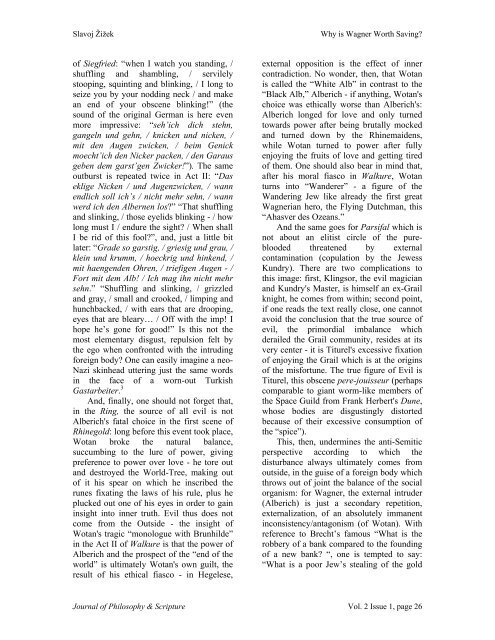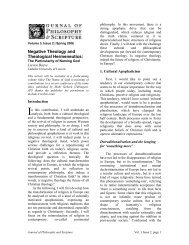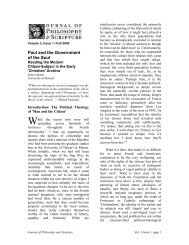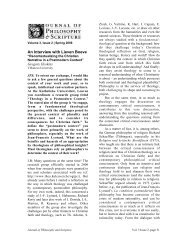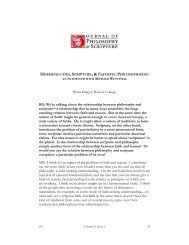Why is Wagner Worth Saving? Slavoj Žižek - Journal of Philosophy ...
Why is Wagner Worth Saving? Slavoj Žižek - Journal of Philosophy ...
Why is Wagner Worth Saving? Slavoj Žižek - Journal of Philosophy ...
You also want an ePaper? Increase the reach of your titles
YUMPU automatically turns print PDFs into web optimized ePapers that Google loves.
<strong>Slavoj</strong> Žižek<br />
<strong>Why</strong> <strong>is</strong> <strong>Wagner</strong> <strong>Worth</strong> <strong>Saving</strong>?<br />
<strong>of</strong> Siegfried: “when I watch you standing, /<br />
shuffling and shambling, / servilely<br />
stooping, squinting and blinking, / I long to<br />
seize you by your nodding neck / and make<br />
an end <strong>of</strong> your obscene blinking!” (the<br />
sound <strong>of</strong> the original German <strong>is</strong> here even<br />
more impressive: “seh’ich dich stehn,<br />
gangeln und gehn, / knicken und nicken, /<br />
mit den Augen zwicken, / beim Genick<br />
moecht’ich den Nicker packen, / den Garaus<br />
geben dem garst’gen Zwicker!”). The same<br />
outburst <strong>is</strong> repeated twice in Act II: “Das<br />
eklige Nicken / und Augenzwicken, / wann<br />
endlich soll ich’s / nicht mehr sehn, / wann<br />
werd ich den Albernen los?” “That shuffling<br />
and slinking, / those eyelids blinking - / how<br />
long must I / endure the sight? / When shall<br />
I be rid <strong>of</strong> th<strong>is</strong> fool?”, and, just a little bit<br />
later: “Grade so garstig, / griesig und grau, /<br />
klein und krumm, / hoeckrig und hinkend, /<br />
mit haengenden Ohren, / triefigen Augen - /<br />
Fort mit dem Alb! / Ich mag ihn nicht mehr<br />
sehn.” “Shuffling and slinking, / grizzled<br />
and gray, / small and crooked, / limping and<br />
hunchbacked, / with ears that are drooping,<br />
eyes that are bleary… / Off with the imp! I<br />
hope he’s gone for good!” Is th<strong>is</strong> not the<br />
most elementary d<strong>is</strong>gust, repulsion felt by<br />
the ego when confronted with the intruding<br />
foreign body? One can easily imagine a neo-<br />
Nazi skinhead uttering just the same words<br />
in the face <strong>of</strong> a worn-out Turk<strong>is</strong>h<br />
Gastarbeiter. 3<br />
And, finally, one should not forget that,<br />
in the Ring, the source <strong>of</strong> all evil <strong>is</strong> not<br />
Alberich's fatal choice in the first scene <strong>of</strong><br />
Rhinegold: long before th<strong>is</strong> event took place,<br />
Wotan broke the natural balance,<br />
succumbing to the lure <strong>of</strong> power, giving<br />
preference to power over love - he tore out<br />
and destroyed the World-Tree, making out<br />
<strong>of</strong> it h<strong>is</strong> spear on which he inscribed the<br />
runes fixating the laws <strong>of</strong> h<strong>is</strong> rule, plus he<br />
plucked out one <strong>of</strong> h<strong>is</strong> eyes in order to gain<br />
insight into inner truth. Evil thus does not<br />
come from the Outside - the insight <strong>of</strong><br />
Wotan's tragic “monologue with Brunhilde”<br />
in the Act II <strong>of</strong> Walkure <strong>is</strong> that the power <strong>of</strong><br />
Alberich and the prospect <strong>of</strong> the “end <strong>of</strong> the<br />
world” <strong>is</strong> ultimately Wotan's own guilt, the<br />
result <strong>of</strong> h<strong>is</strong> ethical fiasco - in Hegelese,<br />
external opposition <strong>is</strong> the effect <strong>of</strong> inner<br />
contradiction. No wonder, then, that Wotan<br />
<strong>is</strong> called the “White Alb” in contrast to the<br />
“Black Alb,” Alberich - if anything, Wotan's<br />
choice was ethically worse than Alberich's:<br />
Alberich longed for love and only turned<br />
towards power after being brutally mocked<br />
and turned down by the Rhinemaidens,<br />
while Wotan turned to power after fully<br />
enjoying the fruits <strong>of</strong> love and getting tired<br />
<strong>of</strong> them. One should also bear in mind that,<br />
after h<strong>is</strong> moral fiasco in Walkure, Wotan<br />
turns into “Wanderer” - a figure <strong>of</strong> the<br />
Wandering Jew like already the first great<br />
<strong>Wagner</strong>ian hero, the Flying Dutchman, th<strong>is</strong><br />
“Ahasver des Ozeans.”<br />
And the same goes for Parsifal which <strong>is</strong><br />
not about an elit<strong>is</strong>t circle <strong>of</strong> the pureblooded<br />
threatened by external<br />
contamination (copulation by the Jewess<br />
Kundry). There are two complications to<br />
th<strong>is</strong> image: first, Klingsor, the evil magician<br />
and Kundry's Master, <strong>is</strong> himself an ex-Grail<br />
knight, he comes from within; second point,<br />
if one reads the text really close, one cannot<br />
avoid the conclusion that the true source <strong>of</strong><br />
evil, the primordial imbalance which<br />
derailed the Grail community, resides at its<br />
very center - it <strong>is</strong> Titurel's excessive fixation<br />
<strong>of</strong> enjoying the Grail which <strong>is</strong> at the origins<br />
<strong>of</strong> the m<strong>is</strong>fortune. The true figure <strong>of</strong> Evil <strong>is</strong><br />
Titurel, th<strong>is</strong> obscene pere-jou<strong>is</strong>seur (perhaps<br />
comparable to giant worm-like members <strong>of</strong><br />
the Space Guild from Frank Herbert's Dune,<br />
whose bodies are d<strong>is</strong>gustingly d<strong>is</strong>torted<br />
because <strong>of</strong> their excessive consumption <strong>of</strong><br />
the “spice”).<br />
Th<strong>is</strong>, then, undermines the anti-Semitic<br />
perspective according to which the<br />
d<strong>is</strong>turbance always ultimately comes from<br />
outside, in the gu<strong>is</strong>e <strong>of</strong> a foreign body which<br />
throws out <strong>of</strong> joint the balance <strong>of</strong> the social<br />
organ<strong>is</strong>m: for <strong>Wagner</strong>, the external intruder<br />
(Alberich) <strong>is</strong> just a secondary repetition,<br />
externalization, <strong>of</strong> an absolutely immanent<br />
incons<strong>is</strong>tency/antagon<strong>is</strong>m (<strong>of</strong> Wotan). With<br />
reference to Brecht’s famous “What <strong>is</strong> the<br />
robbery <strong>of</strong> a bank compared to the founding<br />
<strong>of</strong> a new bank? “, one <strong>is</strong> tempted to say:<br />
“What <strong>is</strong> a poor Jew’s stealing <strong>of</strong> the gold<br />
<strong>Journal</strong> <strong>of</strong> <strong>Philosophy</strong> & Scripture Vol. 2 Issue 1, page 26


